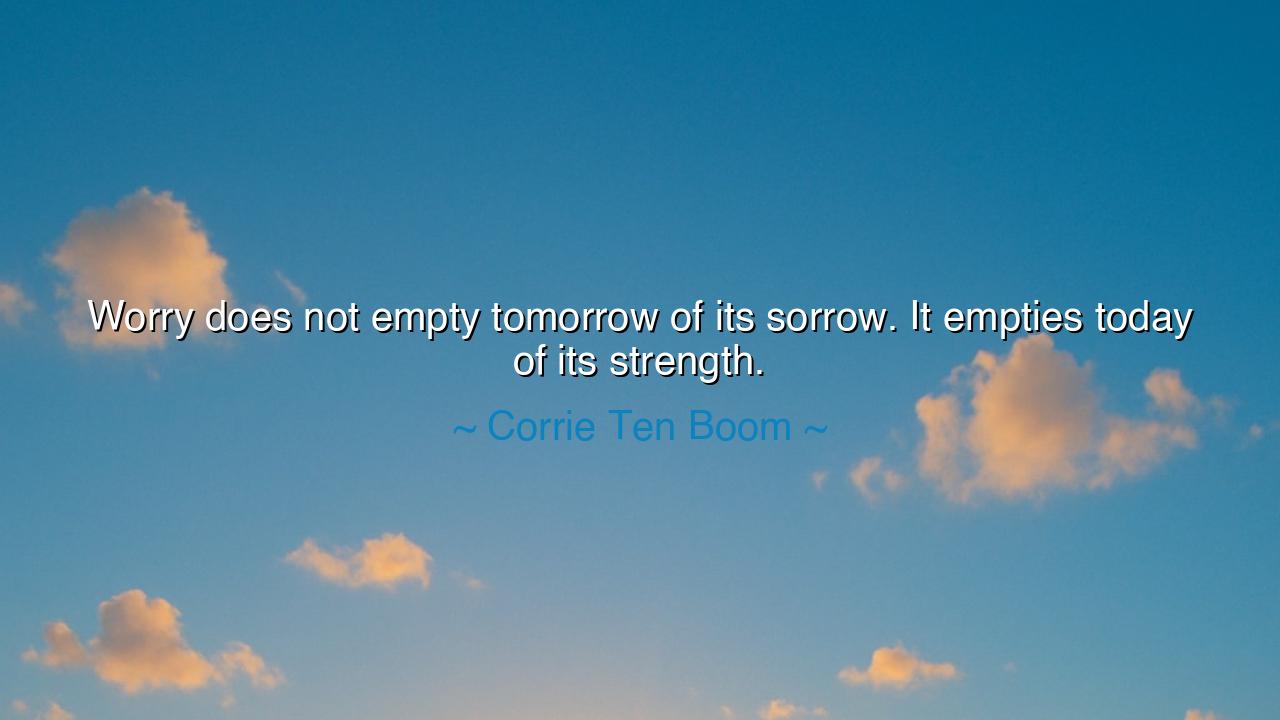
Worry does not empty tomorrow of its sorrow. It empties today of






Corrie Ten Boom, survivor of war’s darkest shadow and bearer of unshakable faith, once declared: “Worry does not empty tomorrow of its sorrow. It empties today of its strength.” These words, spoken by one who endured the crucible of Nazi concentration camps, carry weight not only of thought but of lived truth. For she knew what it meant to live under fear of the future — yet she also knew that fear, when left unchecked, robs us of the power to face the present.
The ancients too proclaimed this wisdom. In the Sermon on the Mount, Christ himself taught: “Take no thought for the morrow: for the morrow shall take thought for the things of itself. Sufficient unto the day is the evil thereof.” Likewise, the Stoics of Greece and Rome declared that fear of what may come only enslaves the mind. Epictetus said, “Man is not troubled by events, but by the views he takes of them.” Thus Corrie’s words stand in a lineage as old as time: that worry multiplies pain, turning one sorrow into two — the imagined burden of tomorrow and the weakened spirit of today.
History gives us clear mirrors of this truth. Consider Winston Churchill during the Second World War. Night after night, London was bombed. Each dawn seemed to promise destruction. Yet Churchill urged his people not to surrender to worry, for if they yielded to fear of what might come tomorrow, they would lose the courage needed for today. And indeed, it was strength in the present — sandbags filled, fires extinguished, spirits lifted — that carried Britain through the storm. Their triumph was born not from brooding on future sorrows, but from facing each day with undiminished will.
Corrie Ten Boom’s own life is perhaps the purest example. Imprisoned for hiding Jews during the Holocaust, she lost her sister, suffered hunger, and saw death on every side. She confessed that she often feared the days to come. But in time she learned that worry did nothing to prevent tomorrow’s suffering; it only drained her capacity to endure today’s trials. By clinging instead to faith, to courage, to action in the present, she survived — and later brought her message of hope to the world. Her words are born not of speculation, but of survival.
This wisdom is not only for kings and survivors of war, but for all who live. How many of us spend our days fearing tomorrow — the sickness that may come, the loss that may strike, the failure that may await? Yet by so doing, we exhaust our souls, leaving no strength to meet the tasks of the present. Thus we rob ourselves twice: once by imagining sorrows that may never arrive, and again by losing the vigor of today. To live in worry is to fight shadows while leaving ourselves defenseless against the real battles of the moment.
The practical action is this: when fear for the future rises, return your mind to the present. Ask, What strength is needed today? Take the small steps before you with courage. Speak the words of kindness, complete the tasks of duty, savor the blessings at hand. By doing this, you build resilience for tomorrow without draining today. Prayer, meditation, and gratitude are also shields against worry, anchoring the heart in what is real instead of what is imagined.
So, O seekers of wisdom, remember Corrie Ten Boom’s teaching: “Worry does not empty tomorrow of its sorrow. It empties today of its strength.” Do not let fear rob you twice. Accept that tomorrow may bring pain, but let it bring it in its own time. Today is yours, and it is holy. Live it fully, with courage, with strength, and with hope, for these are the treasures that will prepare you for whatever dawn awaits. In this way, sorrow loses its sting, and life, even in hardship, becomes radiant.






AAdministratorAdministrator
Welcome, honored guests. Please leave a comment, we will respond soon